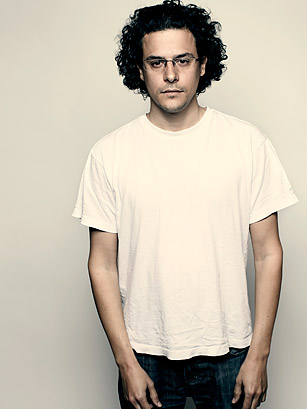
By some lights, Olmo Gálvez was born to be a revolutionary. His parents, both doctors, named him after the socialist protagonist (played by Gérard Depardieu) of Bernardo Bertolucci's film 1900. But it wasn't until this year that he began to act on that predestined fate. Frustrated with the lack of opportunities in Spain, he had taken his business degree and left the country, working for three years in China. When he returned in 2010, the situation was even worse, and he found himself diligently following the Twitter feed of Youth Without Future (initials JSF in Spanish). He went to his first protest, organized by JSF, in April. "My plan was just to go there and tweet about it," says the 31-year-old, who works in IT. "But I kept meeting more and more people, including those that were starting to form the consortium Democracia Real Ya, and was impressed with what they were doing. So I asked how I could collaborate."
He ended up organizing social networks for DRY as the group began to plan its own protest march for May. The route was from the Atocha train station to the centrally located Puerta del Sol. "Sol was supposed to be the end of the demonstration, not the beginning," says Gálvez. "So there was a bit of discomfort when we arrived, and there were all these others joining us. At first we were like, who are these people? But then it felt like we were passing the baton to something even bigger."
Just how big became clear as Gálvez monitored DRY's Google analytics. "We went from 300 to 3,000 to 70,000 hits in the period of a day. So we were able to predict that it was going to keep growing." As they had in Tahrir Square, social media not only helped spread word of what was happening but acquired a new degree of authority. "Mainstream media had no idea what was going on and wasn't reporting it at all," he says. "So we turned to our own media."
Gálvez was at the first general assembly on May 16th. "It was marvelous to see people become the actors in their own lives. You could watch them breaking out of their passivity. They turned off the TV, left their homes, went to the plaza and entered into community with each other." That sensation kept him returning for other assemblies — as the holes in the back pockets of his jeans, worn through from sitting on the pavement, prove.
There have been relatively few low points for Gálvez. One of the first came earlier on, when the group was uncertain about how the authorities were going to respond. "We started getting messages that the police were going to attack; that was very tense." But for the first weeks and then months, the police in Madrid were mostly restrained. It wasn't until August that they moved to clear the few remaining tents from the plaza, sparking a revival of protest for several days as demonstrators tried to retake Sol. "But by then a large percentage of the movement thought it was time to go," says Gálvez. "And the government later agreed to let us keep our information booth there, which was important."
The good moments have outweighed the bad. One of the best came in July, when Gálvez and other demonstrators were camping out on the Paseo del Prado, one of Madrid's main arteries, with a green strip in the middle. "We woke up that morning, and all these people from Huelva (a region in the south that produces much of Europe's strawberry crop) were there. They had brought us strawberries as a sign of solidarity." Gálvez keeps a photo of that breakfast berry, with a bite out of it, on his phone.
It was about that time that he and others from DRY began exchanging ideas with like-minded people in the U.S. and elsewhere. "We've known since July that Occupy Wall Street was going to happen," Gálvez says. Some North American organizers went to Spain to witness events firsthand, but mostly the two groups communicated online. Many of the distinguishing practices of OWS — and the protests from Oakland to Rome — originated in the Puerta del Sol: the wiggling of hands to show approval, the food-distribution centers, the insistence on "horizontalness" and a lack of leaders, the on-site libraries.
One night in November, Gálvez attended a DRY assembly held in a building that squatters had turned into a community center, complete with dance studios and café. Like all such meetings, it lasted three hours, and for a while, discussion centered on how to get out the word that supporters should not abstain from voting in Spain's national elections, held later that month. Walking over to it, Gálvez made no excuse for the slow (even nonexistent) pace of change that the movement is sometimes accused of. "In a traditional political situation, five people decide something and then try to convince millions of others about it. Here, it's the millions that are deciding for themselves, and that takes time. You have to prepare the dough before you can bake the bread."
Asked why he believes the movement has been as successful as it has, Gálvez likes to quote Gandhi: "We've achieved what we have so far because we didn't know it was impossible."